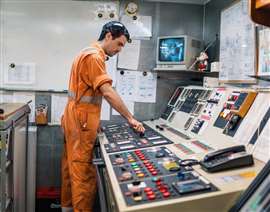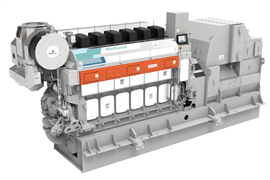Read this article in 中文 Français Deutsch Italiano Português Español
Improving maritime fuel efficiency by addressing crew behaviors
26 May 2024
Signol helps commercial ships incentivize their crews to save fuel and drive sustainability.
Maritime transportation of goods around the world is a costly venture, in no small part because of the cost of fuel. According to marine fuel publication Ship & Bunker, the six-month average price of very low sulfur fuel oil (VLSFO) at the 20 fuel bunkering ports around the world that account for most global fuel volumes is about $650 per metric ton. A January 2020 article on the website of freight price reporting agency FreightWaves said a Panamax container ship, one sized to go through the Panama Canal, can hold as much as 3.5 million gal. of fuel — about 12,400 metric tons, based on average VLSFO density.
Given this, fuel efficiency is a crucial aspect of successful maritime fleet operations. While many have addressed this as an engineering problem — such as with the Wärtsilä 31 diesel engine, reported on by Power Progress in March 2023 — there are behaviors among ship crews that can be influenced to contribute to fuel efficiency.
 Harriet Hunnisett-Johnson, head of maritime for Signol. (Photo: Signol)
Harriet Hunnisett-Johnson, head of maritime for Signol. (Photo: Signol)
Signol is a London-based digital fuel efficiency service designed to make it easier for crew members to save fuel via behavior change techniques through a web app and targeted emails. Harriet Hunnisett-Johnson, head of maritime for Signol and a former deck officer at sea, said that what a crew does — or does not do — aboard ship can have a dramatic impact on fuel consumption and sustainability, today and in the future.
“By 2035, shipping companies will face much higher fuel costs than they do today, whether they choose sustainable fuel or not,” Hunnisett-Johnson said via email. “Just as crew behavior currently impacts fossil fuel consumption, it will be just as central for fuel efficiency in the future when a 5 percent savings represents a much higher financial value.”
Fuel-Efficient Crew
In an interview with Power Progress, Hunnisett-Johnson said she believes in the notion of a “fuel-efficient crew” — one that adheres to a culture of fuel efficiency.
“It’s one that is proactive and understands that fuel efficiency is something that they want to achieve,” she said.
Motivating a crew in this way, however, can be a challenge.
“The idea of saving money for your boss — that’s not a big motivational factor for anyone, especially if your boss is thousands of miles away on the other side of the world,” Hunnisett-Johnson said. “You’ve probably never met them. You probably never will. Or the person you’re saving money for is maybe some charterer who’s got no link to you whatsoever — your boss is the ship owner.”
She said crews need other motivations that encourage them to be fuel efficient. One way of fostering that is to capitalize upon their work ethic.
“You’ll find with seafarers that they are very proud of what they do,” Hunnisett-Johnson said. “They are well trained — highly trained — individuals who are very good at their jobs, and they want to be good at their jobs. They live their jobs quite literally — they’re on board 24/7.”
Driving Operational Excellence
According to Hunnisett-Johnson, it’s critical to get crews to equate fuel efficiency with operational excellence. As an example, she said an engineer on a ship running three auxiliary engines would have to begin turning off one of those engines when power demand drops. If doing that coincides with a scheduled break, however, the engineer might put the task off.
“What’s your motivation right now as a human being?” Hunnisett-Johnson said. “Are you going to take the efficient, logical decision to stay and do that, or are you going to go and have a cup of coffee with the other crew members?”
Listen to Harriet Hunnisett-Johnson of Signol talk about the value of motivation among a ship’s crew
She said Signol seeks to give crew members a reason to stay and make the fuel-efficient choice. This includes setting goals for them.
“Like, your goal is to make sure that you have less than half an hour extra running time on these engines for at least four days over the next seven,” Hunnisett-Johnson said. “If I stay here, I’m actually going to achieve my goal. Maybe I’ll do that.”
Incentives for fuel-efficient behavior are also part of the regimen.
“We do pro-social incentives, where if you hit your goal, a certain amount is donated to the charity of your choice,” she said, as an example.
According to Hunnisett-Johnson, crew members will soon link such goals and incentives with the quality of their work.
“You’re seeing that you’re good at your job,” she said, adding that it gives the crew member an emotional and moral reason to be fuel-efficient.
“When you show someone that they have done this, you say, ‘Do you know what you did — the equivalent of planting 10,000 trees last week?’ That’s big,” Hunnisett-Johnson said. “Suddenly you’re helping the world, as well.”
 Signol helps commercial ships motivate their crews to engage in fuel-efficient behavior. (Photo: Alamy)
Signol helps commercial ships motivate their crews to engage in fuel-efficient behavior. (Photo: Alamy)
Significant Fuel Savings
Such small, incremental contributions among individual crew members can add up to significant fuel savings.
“Five to 12 percent is the savings that we’ve been looking at,” Hunnisett-Johnson said, “to the point where we thought hang on a minute, this is almost too much.”
Signol conducted a four-month project with Bernhard Schulte Shipmanagement (BSM) in 2022 that engaged 30 ship masters and chief engineers across 23 BSM-managed vessels. The project saved over $3 million in fuel costs and eliminated 13,900 metric tons of carbon dioxide (CO2), the company said. An analysis showed the project achieved a 12 percent reduction in bunker fuel consumption.
A six-month project conducted with Ridgebury Tankers showed that crew members across four vessels made fuel-saving decisions 21 percent more often, Signol said. Ridgebury didn’t publicize its specific fuel savings, but Signol said similar increases in fuel-saving behavior for other projects have achieved around a 10 percent reduction in fuel consumption.
Efficiency and Sustainability
While less fuel burned means fewer emissions, Hunnisett-Johnson said ensuring a crew is engaged in fuel efficiency will extend to improved sustainability efforts.
“There’s no one silver-bullet fuel that’s going to come along and take over,” she said, speaking about alternative fuels. “I think the shipping industry actually needs the crew to be really positively engaged in the whole process. Because we need to make sure that all the learnings are captured and that the right solutions are adopted.”
Hunnisett-Johnson said crews engaged in emissions reduction strategies — having a reason to do it — will monitor and truthfully assess those solutions.
“We need to be efficient in everything that we do on board to make sure to make it even possible to put alternative fuels on board — to make it viable,” she said. “So, in my mind, it’s a necessity. A crew that is acting efficiently is a necessity to move ahead in getting new fuels on board.”
POWER SOURCING GUIDE
The trusted reference and buyer’s guide for 83 years
The original “desktop search engine,” guiding nearly 10,000 users in more than 90 countries it is the primary reference for specifications and details on all the components that go into engine systems.
Visit Now
STAY CONNECTED




Receive the information you need when you need it through our world-leading magazines, newsletters and daily briefings.
CONNECT WITH THE TEAM















